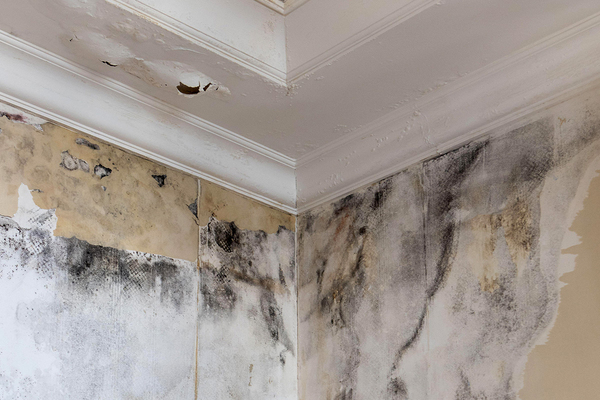Toddler died from prolonged exposure to mould in housing association flat, coroner rules
A toddler living in a social housing block died from a respiratory condition caused by prolonged exposure to mould in his family’s one-bedroom flat, a coroner has said.
Two-year-old Awaab Ishak died in December 2020 from a respiratory condition caused by mould in a Rochdale Boroughwide Housing (RBH) flat, where he lived with parents Faisal Abdullah and Aisha Amin in Rochdale, Greater Manchester.
The coroner said the death of the toddler, who suffered prolonged exposure to mould, should be a “defining moment” for the housing sector.
A Rochdale Coroner’s Office inquest was told that Mr Abdullah had previously complained to RBH about the mould.
Giving her findings on Tuesday, senior coroner Joanne Kearsley said: “I’m sure I’m not alone in having [this] thought, ‘How does this happen? How, in the UK in 2020, does a two-year-old child die from exposure to mould in his home?’
“The tragic death of Awaab will and should be a defining moment for the housing sector in terms of increasing knowledge, increasing awareness and a deepening of understanding surrounding the issue of damp and mould.”
Addressing the toddler’s parents, Ms Kearsley said: “I hope you know that Awaab will, I am sure, make a difference for other people.”
Responding to the coroner’s conclusion, Gareth Swarbrick, chief executive of RBH, said he was truly devastated about Awaab’s death and the things that the organisation got wrong.
He added: “We must make sure this can never happen again. Awaab’s death needs to be a wake-up call for everyone in housing, social care and health.”
In her findings, the coroner described Awaab as “an engaging, lively, endearing two-year-old”.
She said Mr Abdullah reported mould developing in the Tweedale Street flat to RBH in 2017 and was told to paint over it.
In June 2020, Mr Abdullah instructed solicitors and initiated a claim over the recurring issue, but the policy meant that any repairs would not be done until an agreement had been reached, the inquest heard.
A health visitor also contacted RBH to raise the issue in July 2020 and an inspection that month found mould in the kitchen, bathroom and a bedroom cupboard that needed treatment.
Ms Kearsley said the mould was due to “normal daily living activities” and a lack of effective ventilation.
She said: “I find as a matter of fact that no action was taken and, from July 2020 until December 2020, Awaab continued to have chronic exposure to harmful mould.”
Awaab was taken to Rochdale Urgent Care Centre on 19 December 2020 with shortness of breath and transferred to Royal Oldham Hospital before being discharged, the court heard.
The coroner said the family should have been told to call an ambulance or take him directly to Royal Oldham Hospital if he had further difficulties.
Awaab deteriorated the next day and his parents were advised by the Community Children’s Nursing Team to take him back to the Rochdale Urgent Care Centre.
He went into respiratory arrest and then cardiac arrest while being transferred to Royal Oldham Hospital, the inquest heard.
Awaab died after arriving at Royal Oldham Hospital.
The coroner said: “Awaab Ishak died as a result of a severe respiratory condition caused due to prolonged exposure to mould in his home environment.
“Action to treat and prevent the mould was not taken. His respiratory condition led to respiratory arrest.
“The medical advice given to his parents led to Awaab receiving suboptimal ventilation of his airway which was unable to prevent his cardiac arrest.”
Ms Kearsley said the issue is “not simply a Rochdale problem”.
She said she will be writing a report for the prevention of future deaths and will write to the minister for housing as well as health secretary Steve Barclay to raise the issue.
Christian Weaver, counsel for Awaab’s family, said: “Instead of Awaab’s parents preparing for his 4th birthday, they have had to sit through a gruelling inquest process and hear the multiple ways in which the very organisations supposed to take care of Awaab failed to do so.
“Awaab’s parents did everything within their powers to try and have the issues within their home fixed, however, time and time again, their pleas were ignored. Awaab’s parents have shown remarkable dignity throughout the inquest process.
“Their only ask is that once and for all, the conditions for those in social housing can be improved – particularly where damp and mould is concerned and particularly where the occupiers of the homes are refugees and may not be as aware of systems and processes here in the UK.
“I hope that the findings arising out of this inquest play a significant role in helping achieve this.”
Mr Swarbrick said: “We know that nothing we can say will bring Awaab back or be of any consolation to his family. We have and will continue to learn hard lessons from this.
“We didn’t recognise the level of risk to a little boy’s health from the mould in the family’s home.
“We allowed a legal disrepair process, widely used in the housing sector, to get in the way of promptly tackling the mould.
“We must make sure this can never happen again. Awaab’s death needs to be a wake-up call for everyone in housing, social care and health.
“We will take responsibility for sharing what we have learnt about the impact to health of damp, condensation and mould with the social housing sector and beyond.
“The coroner recognised the changes we have made to our procedures, IT, communications and training. We note the coroner’s words that she was impressed with the learning RBH has taken and desire to share with others.
“As a result, she will not be issuing us with a prevention of future of deaths report.
“We agree with the coroner that the tragic death of Awaab will be and should be a defining moment for the housing sector.”
Sign up for our regulation and legal newsletter
Already have an account? Click here to manage your newsletters












